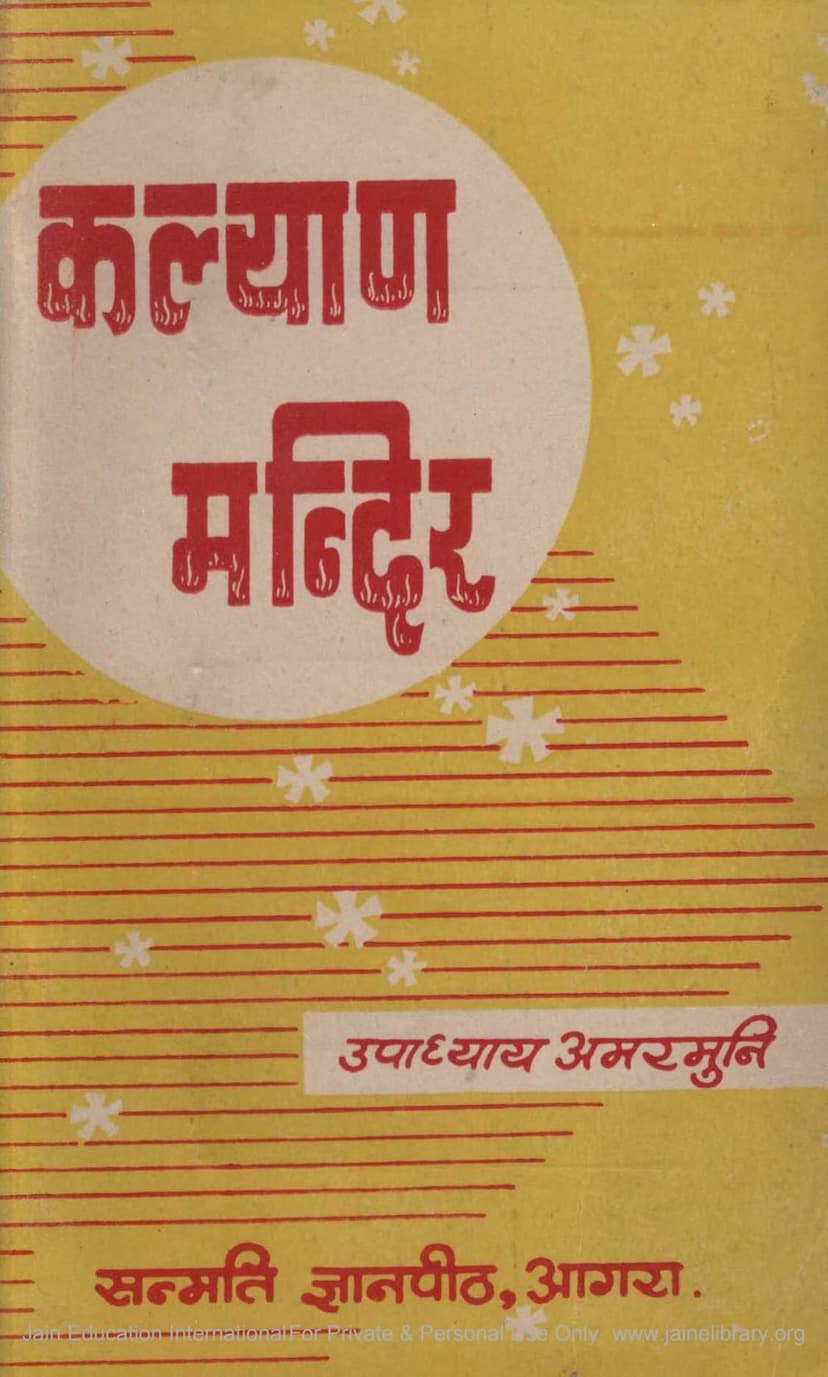Kalyan Mandir
Added to library: September 2, 2025

Summary
Here's a comprehensive summary of the Jain text "Kalyan Mandir," based on the provided pages:
The book "Kalyan Mandir" is a collection of Jain devotional hymns, primarily focusing on the praise and glorification of Lord Parshvanath, the 23rd Tirthankara of Jainism. The text includes the original Sanskrit/Prakrit hymns, their Hindi translations and commentary, and also features other related prayers like the "Upsargahar Stotra" and "Chintamani Stotra."
Key Aspects and Content:
- Author and Publisher: The book is presented as "Kalyan Mandir" by Upadhyay Amarmuni, published by Sanmati Gyan Pith, Agra. The fifth edition was published in November 1980.
- Purpose: The publication aims to provide readers with devotional literature for their daily practices, hoping it will sanctify their lives and imbue them with divine qualities.
- Structure (from the Index):
- Kalyan Mandir Stotra (Sanskrit): The main hymn, presented with its Sanskrit verses, meaning, and commentary.
- Kalyan Mandir Stotra (Hindi): A Hindi translation or commentary of the main hymn.
- Upsargahar Stotra (Prakrit): A hymn dedicated to warding off calamities, presented with its meaning.
- Chintamani Stotra (Sanskrit): Another significant hymn, with its Sanskrit verses and meaning.
- Chintamani Stotra (Hindi): A Hindi rendering of the Chintamani Stotra.
- Content of Kalyan Mandir Stotra (as exemplified in the provided verses):
- Praise of Lord Parshvanath: The stotra begins with profound reverence for Lord Parshvanath, describing him as a "temple of welfare," noble, a destroyer of faults, a bestower of fearlessness to the terrified, and a boat for beings drowning in the ocean of worldly existence.
- Humility of the Poet: The author frequently expresses his own inadequacy and limited intellect when attempting to describe the infinite glories of the Lord. He uses analogies like a child trying to measure the ocean with his hands or a child's eye unable to describe the sun.
- The Power of the Lord's Name and Presence: The text highlights the immense power of Lord Parshvanath's name and presence. Merely meditating on Him can weaken karmic bonds, just as snakes loosen their grip on a sandalwood tree when a peacock approaches. His presence dispels all troubles and dangers, similar to how a strong herdsman scares away thieves.
- Overcoming Obstacles and Enemies: The stotra draws upon the historical incident of Kamatha, a demon who troubled Lord Parshvanath. The narrative emphasizes how Lord Parshvanath, through his spiritual strength and non-violence, overcame the demon's attacks (dust, water, and demonic forces), demonstrating that such external forces ultimately harm the perpetrator.
- The Nature of Devotion: The importance of sincere devotion and internal feeling (bhava) over mere ritualistic actions is stressed. True devotion leads to spiritual liberation.
- Lord Parshvanath's Divine Attributes: The text describes Lord Parshvanath as the destroyer of the Krodha (anger) and Kamadeva (lust), the embodiment of infinite qualities, and the ultimate refuge. His divine speech is compared to nectar, bestowing immortality and bliss.
- The Eleven Pratīhāryas (Divine Embellishments): Several verses describe the fourteen Divine Embellishments (Prātihāryas) that manifest in the presence of a Tirthankara, such as the Ashok tree, divine flower showers, the celestial chowries (camaras), the throne, the halo (bhamandal), the divine sound (dundubhi), the three umbrellas (chhatra-traya), the three enclosures (kotas), and the divine music.
- The Nature of Reality and Liberation: The stotra touches upon the Jain concept of the soul's true nature and the path to liberation (moksha), emphasizing that through devotion and right understanding, one can achieve an immortal state.
- The Role of the Chintamani Stotra: The Chintamani Stotra, often considered a powerful mantra, is described as capable of fulfilling all desires, removing misfortune, and bestowing ultimate liberation when meditated upon with devotion.
- The Upsargahar Stotra: This hymn is specifically for removing obstacles and is linked to the "Visahar Fulinga Mantra," highlighting its protective and beneficial qualities.
- The Shri Padmavati Stotra: This section includes hymns dedicated to Goddess Padmavati, the Yakshini associated with Lord Parshvanath, invoking her protection and blessings.
Overall Message:
"Kalyan Mandir" is a profound devotional work that aims to inspire faith, devotion, and spiritual understanding. It extols the virtues of Lord Parshvanath, offering solace, protection, and a path to ultimate liberation for those who sincerely follow his teachings and dedicate themselves to his worship. The commentary often uses relatable analogies from nature and daily life to explain complex spiritual concepts, making the teachings accessible to a wider audience. The book serves as a guide for spiritual seekers on their journey towards self-realization and well-being.